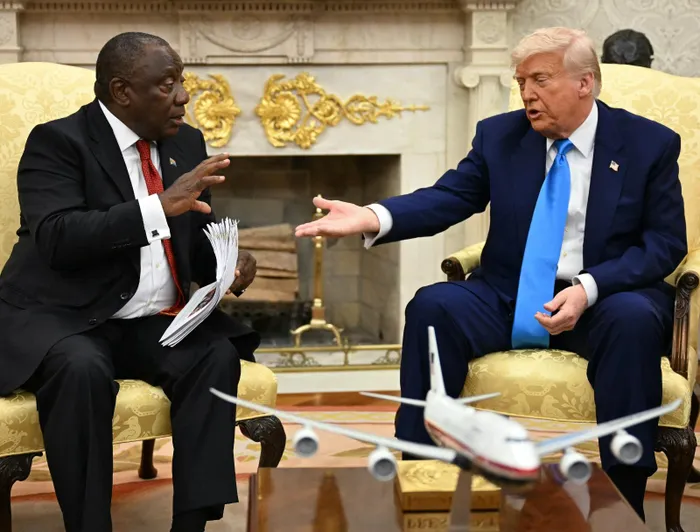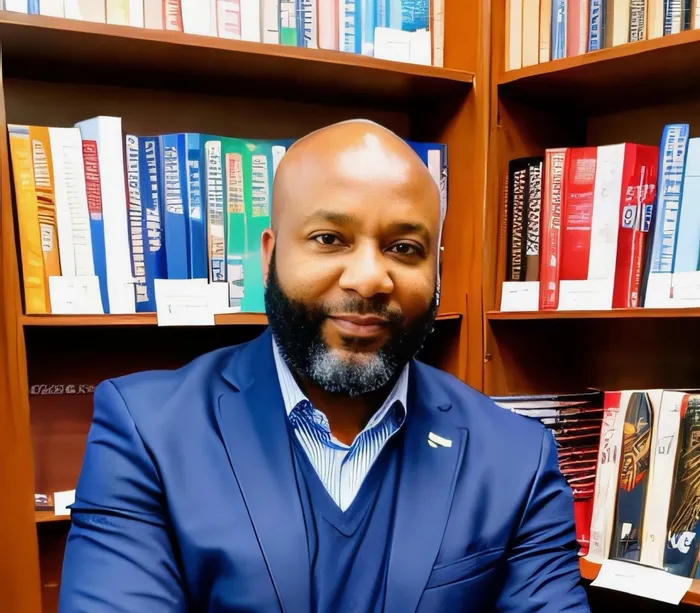The White Genocide Lie is Apartheid Nostalgia

US President Donald Trump hands papers, purporting to be evidence of a white genocide in South Africa, to President Cyril Ramaphosa during a meeting in the Oval Office in Washington on Wednesday.
Image: AFP
South Africa stands at a crossroads, haunted by the ghosts of its apartheid past and battered by the failures of its democratic present. Into this breach, a dangerous and persistent myth has taken root and spread, one that not only distorts reality but weaponises white fear and global ignorance for political gain.
The so-called “white genocide” narrative, parroted by the likes of Donald Trump and Elon Musk, did not originate in the White House or Silicon Valley. It was born in the fevered imaginations of white South Africans unwilling to relinquish the privileges and power they amassed during apartheid, and it is now exported to the world as a grotesque justification for racism and reactionary politics.
This is not just a lie. It is a deliberate, cynical strategy to derail South Africa’s fragile journey towards justice, to undermine every attempt at equality, and to stoke the flames of apartheid nostalgia no matter the cost to the millions who still live with the pain and deprivation that system created.
The Anatomy of a Lie
The “white genocide” myth claims that white South Africans, particularly Afrikaner farmers, are the victims of a coordinated campaign of violence, enabled or even orchestrated by the Black-majority government. Its proponents point to rural crime and farm murders as evidence of ethnic cleansing, ignoring the reality that South Africa’s violent crime epidemic affects all communities, with Black South Africans overwhelmingly the primary victims.
In 2024, South Africa recorded 26,232 murders nationwide. Of these, only 44 were associated with farming communities, and just eight of those victims were farmers—hardly the numbers one would expect from a genocide. Yet the myth persists, repeated in global far-right forums and amplified by powerful figures abroad.
When Trump, in a recent Oval Office meeting with President Cyril Ramaphosa, declared that “there is a genocide occurring against white farmers in South Africa,” he was not speaking truth to power. He was parroting a conspiracy theory that South African courts, the government, and independent observers have thoroughly debunked. Musk, South Africa’s most famous expatriate, has likewise used his X platform to spread this narrative, even deploying his AI bot Grok to push the story online, despite a complete lack of evidence.
This is not just misinformation. It is a calculated act of political sabotage, one that seeks to recast the perpetrators of apartheid as its victims, and to delegitimise the ongoing struggle for land, dignity, and equality in South Africa.
The Real Origins: Apartheid Nostalgia
From the earliest days of democracy, white reactionaries have used fearmongering and victimhood to resist change.
In 2015, a white farmer petitioned the United Nations, accusing the ANC government of genocide against Afrikaners—a claim dismissed by the government as “ludicrous in the extreme”. Yet the petition echoed the same themes: a reversal of roles in which the oppressors of yesterday are cast as the oppressed of today, and the “crime of apartheid” is minimised or justified by alleged Black “hatred” of whites.
This narrative is not about justice or safety. It is about protecting ill-gotten privilege and deflecting attention from the real, ongoing wounds of apartheid. It is about denying the truth that, thirty years after liberation, white South Africans still own the vast majority of the country’s land and wealth. At the same time, Black South Africans remain trapped in poverty and exclusion.
The Weaponisation of Reform
The cynical framing of South Africa’s post-apartheid reformist and redress laws as “140-plus racist laws” by the likes of AfriForum and other unrepentant apartheid apologists is not only intellectually dishonest but also a calculated attempt to delegitimise the very policies designed to address centuries of racial injustice.
Musk, for example, has repeatedly accused South Africa of practising “Apartheid version 2.0,” claiming that there are over 140 laws that discriminate against non-Black individuals and labelling Black Economic Empowerment (BEE) and related legislation as “utterly wrong and improper”. AfriForum, echoing this rhetoric, has released reports and public statements arguing that affirmative action and redress policies constitute “systemic racism” against whites, insisting that such measures are no different from the racist laws of the past and should be abolished.
The BEE and similar policies were introduced as corrective mechanisms to address the entrenched economic and social disparities created by apartheid, where the vast majority of Black South Africans were systematically excluded from land ownership, education, and meaningful participation in the economy.
To equate these efforts at redress with the brutal, state-sanctioned racism of apartheid is an act of bad faith, designed to obscure the ongoing legacy of white privilege and to stoke resentment among those who benefited most from the old order.
AfriForum and its allies have gone further, weaponising the language of “minority rights” and “reverse racism” to challenge land reform, equity measures, and even the legitimacy of the democratic state itself.
When figures like Musk and organisations like AfriForum broadcast these claims on global platforms, they invite external scrutiny and even sanctions, all while painting the democratic government as the villain and white South Africans as the besieged minority. This is not the language of reconciliation or nation-building. It is the language of apartheid nostalgia, repackaged for a new era and a new audience.
The Reality: Apartheid’s Legacy and the Failure of Transformation
The hard truth is that South Africa’s democratic transition, while momentous, has not delivered the economic and social justice promised in 1994. The legacy of apartheid is everywhere: in the spatial geography of our cities, in the persistent inequality of our schools, in the unemployment lines and informal settlements that stretch from Cape Town to Joburg.
Black South African households, who make up the overwhelming majority, still receive only a fraction of the country’s wealth. Unemployment is staggeringly high, particularly among the youth, and the state has failed to deliver on key promises of land reform, quality education, and basic services.
But these failures are not evidence of a campaign against whites. They are the bitter fruit of a system designed to benefit a minority at the expense of the majority and of a democratic government that has too often lacked the will or capacity to reverse that legacy. The real victims of South Africa’s ongoing crisis are not white farmers but the millions of Black South Africans who still live with the daily consequences of apartheid: poverty, violence, and exclusion.
What South Africa needs now is not more lies, not more fearmongering, but a renewed commitment to truth and justice. This means confronting the failures of the democratic government honestly, holding leaders accountable for corruption and mismanagement, and demanding real progress on land reform, education, and economic transformation.
Conclusion: A Call to Conscience
The white genocide lie is more than just a conspiracy theory. It is a moral obscenity, a deliberate attempt to rewrite history and derail the struggle for justice in South Africa. It must be confronted, not just with facts and figures, but with moral clarity and political courage.
We must say, without equivocation: there is no genocide against whites in South Africa. There is only the long, unfinished work of undoing the damage of apartheid and building a society in which all can live in dignity and peace.
To those who peddle this lie, whether in Pretoria or Washington, we say: your nostalgia for apartheid is not just a private failing; it is a public danger. You are not the victims. You are the heirs of a system that inflicted untold suffering on millions, and your refusal to reckon with that history is an insult to those who still struggle for justice.

Nco Dube a political economist, businessman, and social commentator.
Image: Supplied
To the rest of us, the task is clear. We must reject the politics of fear and division and recommit ourselves to the unfinished work of transformation. Only then can we honour the sacrifices of those who fought for freedom and build a South Africa that is truly free, equal, and just for all.
(Dube is a political economist, businessman, and social commentator on Ukhozi FM. His views don't necessarily reflect those of the Sunday Tribune or IOL.
